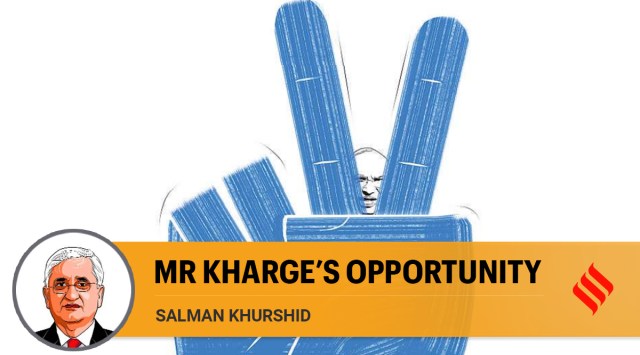
The elections for the president of the Indian National Congress should have been a routine affair, given the long history of internal democracy in the party. However, we cannot complain that so much is being made of it this time. Of course, after over two decades, we will not see a member of the Nehru-Gandhi family occupy the highest office of the party although that was not the intent or aspiration of hundreds of party rank and file. Yet, our leadership has insisted that this is how it must be and we will make the most of it.
Even as we celebrate the initial moments of the tenure of the new president, we cannot stop wondering if many outsiders and the media at large that have shown great interest in the process are genuinely motivated by a commitment to greater democracy in political parties or simply a cynical interest in what the Congress party chooses to do or not do. We seldom see a similar interest shown in the proceedings of other parties, big and small. If the burden of democracy is to be carried by the Indian National Congress, so be it. If higher standards and expectations are meant for our party alone, so be it.
I hope it is now clear that by most standards, we have to thank Madhusudan Mistry and the leaders of the party to have ensured a free and fair election of the president and that the few friendly complaints of an uneven playing field do not really undermine the humongous effort to hold a flawless election across the states and Union territories on one single day and to complete counting within the schedule. It would only be fair that this honest effort is genuinely appreciated and encouraged as an example to other political parties, indeed social organisations that contribute to public life in modern times.
The emphatic victory of Mallikarjun Kharge, a solid veteran with 50 years of organisational and electoral service to the party, might well have been confidently predicted, but not because the election was programmed — rather the sense and historical context of the party pointed in that direction. Shashi Tharoor, widely admired by the young within the party and general public, made a principled and courageous stand, endorsed by a significant number of delegates. One hopes that even in defeat he will persevere to help the winner consolidate the electoral footprint of the party. He might have the example of the late Rajesh Pilot whose unsuccessful bid for presidentship against Sitaram Kesri did not deny him political opportunities for the future.
There are, of course, other important leaders who did not contest this election despite the clear message that all were free to contest and that there would be no officially sponsored candidate. They too will have a greater responsibility to use the outcome of the election process as a launch pad for a combative and ideologically-refocused Congress party. The new president begins his tenure with the benefit of the Bharat Jodo Yatra that relentlessly marched on across the country with Rahul Gandhi in an inspirational lead, physically and intellectually.
This is perhaps the point to underscore, something that is missed by many observers, unknowingly or deliberately. Rahul Gandhi kept himself aloof from the election process and refused the fervent pleas of innumerable party leaders and cadres to take the presidency once again. The election thus became necessary. But this election does not decide who the undisputed leader of the party is and will remain. Sonia Gandhi and Rahul Gandhi will in different ways continue to provide leadership and guidance to the party for the future even as the stature of Kharge grows. He will look after the routine organisational responsibilities guided by the top leadership that will have more time to work on the vision and outreach as we go into election 2024 mode. How things will be streamlined and the consultative process fine-tuned will be worked out at the top. People who do not understand the ethos and culture of our party should just wait to see how things at the top will be managed.
It would suffice at present to underscore that for the past 20 years, through thick and thin, the party has been deeply attached to the Gandhis and indeed, it was their decision and foresight to give this opportunity to evolve another model of leadership. It is important that we give it a chance. Time will tell how this helps the party and the country. Instead of finding fault with what we have done, it is time for our critics to put their money where their mouths are. Change by evolution is not to be devalued against change by revolution, because the cost of the latter can be very high and unpredictable.
The writer is senior Congress leader and former external affairs minister